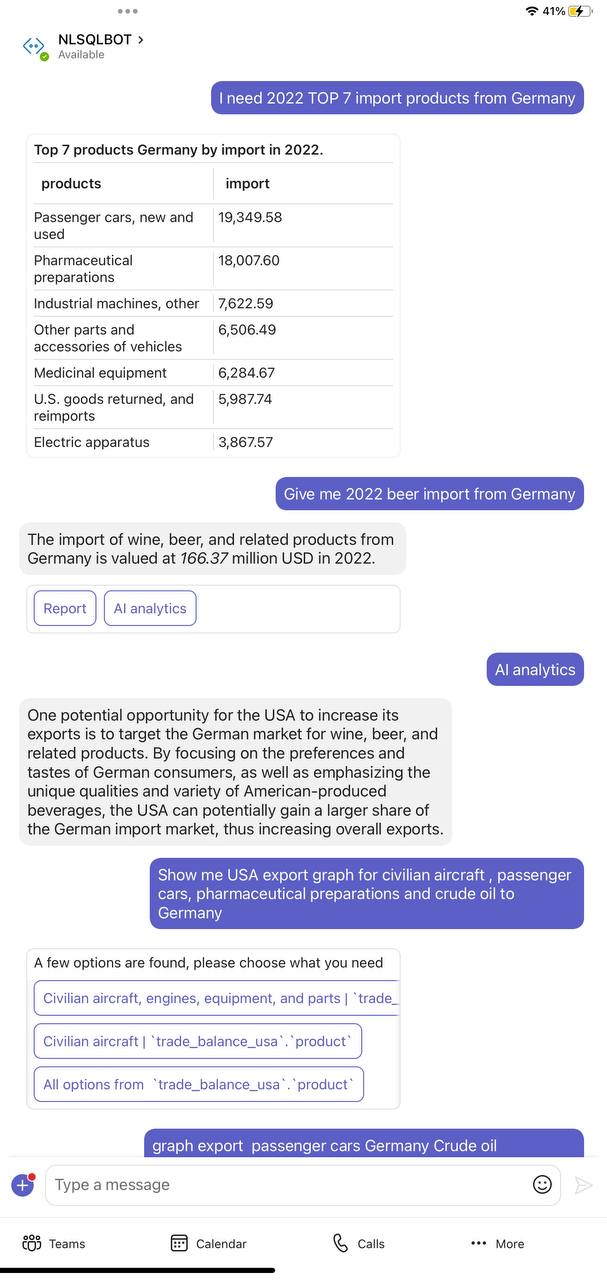Latest News
Introducing NLSQL for Educators: Empowering Students with Free Access to AI-powered Data Analytics
We are thrilled to announce the launch of NLSQL for Educators, a program designed to empower students by providing them with free access to our cutting-edge NLSQL bot system. As part of our commitment to supporting the next generation of innovators, we're offering this unique opportunity to students with a confirmed student ID worldwide.
NLSQL is an advanced AI-powered bot system that enables users to extract information from databases using natural language queries. This innovative technology simplifies data retrieval and analysis, making it more accessible and user-friendly for people with limited technical expertise.
If you're a student interested in taking advantage of this incredible offer, follow the steps below:
1. Email your student ID confirmation to info@nlsql.com with the subject "NLSQL for Educators request".
2. Our team will verify your student status and provide you with detailed instructions for setting up your NLSQL bot system on Azure.
3. Even if …
More:
Contact US


Harnessing Reinforcement Learning to Fine-Tune LLMs for Enhanced NLP
By incorporating reinforcement learning, NLSQL aims to improve the understanding of complex queries, enhance the generation of more accurate responses, and enable seamless human-AI interactions.
Large language models like OpenAI's GPT-4, Meta LAMA2 and open sourced T5 have revolutionised the field of natural language processing by demonstrating unprecedented capabilities in understanding and generating human-like text. However, there's still room for improvement, and NLSQL is at the forefront of this innovation by employing reinforcement learning to fine-tune these LLMs.
Reinforcement learning is a type of machine learning where an agent learns to make decisions by interacting with an environment. In the context of NLP, the agent (LLM) is trained to make better predictions and generate more accurate responses by receiving feedback from the environment (e.g., user input or a predefined dataset). This iterative process allows the model to adapt and improve its performance over time.
NLSQL uses reinforcement learning to optimize …

Unlocking the Power of Data Storytelling: Turning Numbers into Narratives
In today's data-driven world, businesses are generating more data than ever before. While collecting and analyzing this data is crucial for informed decision-making, simply presenting raw numbers and statistics can often lead to confusion or disinterest. This is where the art of "Data Storytelling" comes into play.
What is Data Storytelling?
Data storytelling is the practice of translating complex data into a narrative that is easy to understand and engages your audience. It's not just about presenting numbers; it's about creating a compelling and persuasive story that revolves around your data.
Why Data Storytelling Matters
Data storytelling has become a buzzword in the business world for several reasons:
✔️ Engagement: People connect with stories. By presenting your data in a narrative format, you can engage your audience on an emotional level, making it easier for them to remember and act upon the information.
✔️ Clarity: A well-structured data story simplifies …


Optimizing Data Analysis: MECE Thinking and NLSQL Synergy
In today's data-driven world, extracting insights from structured data is a crucial task for businesses and individuals alike. With the ever-growing volume of information at our fingertips, finding an efficient way to analyze and understand data is essential. This is where the synergy between MECE thinking and NLSQL (Natural Language Structured Query Language) comes into play.
MECE Thinking: A Structured Approach
MECE thinking is a structured problem-solving approach that offers a clear and comprehensive framework for addressing complex issues. It divides problems into mutually exclusive categories that collectively cover all possibilities, ensuring clarity, avoiding overlaps, and providing a logical structure. When applied to data analysis, MECE thinking can help you organize and categorize information effectively.
NLSQL: Bridging the Gap with Natural Language
On the other hand, NLSQL leverages natural language to interact with structured data. It's a bridge between humans and databases, allowing users to ask questions in everyday language. …


How NLSQL Could Enhance SCQ Problem Solving?
Problem-solving is an essential skill in both personal and professional life. Whether you're tackling a complex work issue, making decisions about your future, or simply trying to resolve everyday challenges, having a structured approach can make a significant difference. In this post, we'll explore how two powerful tools, the Situation-Complication-Question (SCQ) mode and Natural Language Structured Query Language (NLSQL), can come together to enhance your problem-solving abilities.
Understanding the SCQ Mode:
The Situation-Complication-Question (SCQ) mode is a problem-solving framework that encourages a systematic approach to addressing challenges. It consists of three key components:
✔️Situation: Begin by clearly defining the current state or situation. This step involves understanding the context, identifying relevant facts, and setting the stage for what needs to be addressed.
✔️Complication: Next, pinpoint the complication or issue within the given situation. This could be an obstacle, a conflict, a constraint, or any factor that is causing the problem …
More:
Try it now for free

